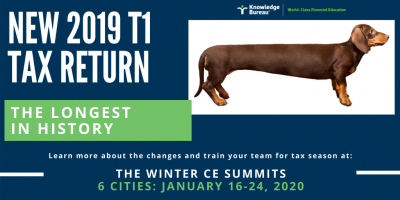Your Top 5 Tax Stories Frame Up Interest in 2019 T1 Filings

Beth Graddon
There are lots of tax changes you’ll need to know about as you get ready to file the new 2019 T1s. This includes a new tax credit for digital news subscriptions, the introduction of passive investment rules for corporate owner-managers, changes to the dividend tax credits, a new CPP deduction for all contributors, a new Canada Training Grant credit and lots of changes to personal amounts. We announced many of these changes as they happened in 2019 and here’s what you, our readers, were most interested in. We’ll drill down even deeper in KBR 2020, so thanks for all of your feedback!
What’s new this year when it comes to federal tax and economic changes?
Here are just a few of the highlights:
Our coverage on the 2019 election results and tax promises also provides more insight into the future of Canada’s income tax system.
Now, onto your top stories of 2019, some of which include more information on the upcoming changes:
#5 - CRA Releases 2018 Guide for Self-Employed Taxpayers...a Little Late!
The Canada Revenue Agency (CRA) released their T4002 Self-employed Business, Professional, Commission, Farming, and Fishing Income for 2018 on March 15, 2019, but the print version was not expected to be available on April 2. Even despite the April 30 deadline for paying outstanding taxes coming up quickly, it was very late notice on rules to claim the massive changes made to Capital Cost Allowance claims for asset purchases after November 20, 2018.
#4 - Post-Budget Hot Topics: Discuss the Home Buyers’ Plan Now
One of the most discussed items to come out of the March 19, 2019 federal budget was the proposed changes to the Home Buyers’ Plan. For the RRSP Home Buyers’ Incentive, individuals  with savings in their RRSPs will be able to tap into more of their savings on a tax -free basis under the Home Buyers’ Plan. An increase in withdrawal from $25,000 to $35,000 will be allowed; couples can thus withdraw up to $70,000 under the HBP.
with savings in their RRSPs will be able to tap into more of their savings on a tax -free basis under the Home Buyers’ Plan. An increase in withdrawal from $25,000 to $35,000 will be allowed; couples can thus withdraw up to $70,000 under the HBP.
#3 - Did You Know? Credits for Transit Costs Still Claimable
The Public Transit Tax Credit was eliminated by the federal government. But in Ontario, seniors who reached age 65 by December 31, 2017, could claim a full-year credit on their 2018 tax return. As important: each taxpayer must claim their own credit, so in the case of a couple, each must file to get a refund, which is quite lucrative. As the Ontario version of this credit was available starting in July 2017, it’s a good idea to review whether taxpayers filed correctly last year – including for the 2019 tax season. Here’s how the credit works: You can claim 15% of the costs of public transit, to a maximum of $3,000 on the 2018 tax return. That’s a maximum credit of $450.
#2 - Really Odd Medical Expenses You Don’t Want to Miss
Medical expenses are among the most commonly overlooked tax provisions and it’s important to pay attention to unreimbursed medical expenses and to claim them as they can be used to reduce taxes payable. CRA has a list of over 130 claimable medical expenses. This article focuses on some odd medical expenses you don’t want to miss claiming.
#1 - Good News for Seniors: GIS Clawbacks Reduced
There was some good news about Canada’s public pension system, especially for low-income seniors who have employment or self-employment earnings, and for tens of thousands of seniors who haven’t been getting their CPP benefits. This article also discussed the automatic CPP enrolment proposed for 2020, that would bring CPP to 40,000 eligible seniors currently missing it, over a twenty-year period.
Some of your top stories appeared in our 2019 Special Editions, including the Special Report on Retirement and the 2019 Federal Budget Report. Click the links to view the full PDF reports.
In 2020, Knowledge Bureau Report will keep you posted on anything new that occurs with these popular topics as the news breaks, as well as on other upcoming tax changes being implemented this year.
Additional educational resources: What should you know immediately about the tax changes impacting 2019 tax return filing? Find out at the Winter CE Summits travelling to 6 cities from January 16-24. It’s Canada’s most comprehensive T1 filing course for 2019 returns, taught by Canadian tax experts Evelyn Jacks, Walter Harder, and Henry Shew. In Toronto on January 20, Mark Mayer from the CRA will be joining the roster as a special guest speaker. Register by January 10 to take advantage of special early-bird tuition rates.

COPYRIGHT OWNED BY KNOWLEDGE BUREAU INC., 2020.
UNAUTHORIZED REPRODUCTION, IN WHOLE OR IN PART, IS PROHIBITED.